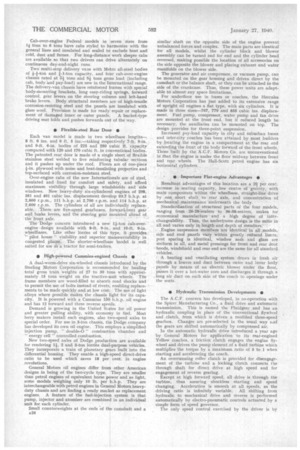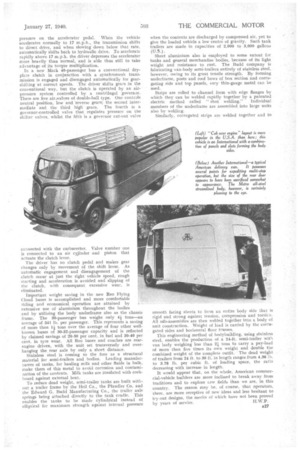Passing Comments
Page 28

Page 29

If you've noticed an error in this article please click here to report it so we can fix it.
May a Bus Driver p ATHER an amusing inciDescen d from His 1•dent occurred to us the
Seat other day. We were driving into Tottenham Court Road, London, from a side road, and were able easily to cross one stream of traffic. At the other side there was ample space between a bus and a car, and we took advantage of this, but the bus driver was annoyed and hooted several times. A few seconds later, the traffic was arrested. The bus driver then descended from his seat, walked to the side of our car and made a strong protest. We gently informed him that he was inclined to be a road hog and that if there was any fault it was on his side. In the meantime the traffic in front had proceeded, and we wondered what would have teen the position of this driver if a constable had been available to inquire the cause of the stoppage. The Two-stroke EnnN a number of occasions in gine to Save Weight %-• the past we have pointed and Space . . out that the four-stroke-cycle
principle of engine operation is uneconomic of space and weight. Theoretically, a two-stroke engine of half the size of a four-stroke unit should develop equal power. It is of interest, on this account, to learn that, in America, Chevrolet lorries with twin-cylindered two-stroke oil engines will shortly be in production. The units are products of the General Motors Corporation and have Roots-type blowers for charging the cylinders with air. Each cylinder has two exhaust valves, induction being through ports, uncovered by the piston at the bottom of the stroke. The introduction of a range of twostroke oil engines, of which these form a part, was referred to in The Commercial Motor just under a year ago. The Hydraulic Ram THE chances of a pair of that Refused to Do tipping rams failing to Its, Duty synchronize being somewhat
remote, there may be some excuse for a driver turning his back on the tipping operation. Imagine the result, however, of one -ram of a twin-ram side-tipping lorry refusing to function whilst the other is taken to full elevation. We recently observed this unusual happening and were somewhat surprised to observe that the body, although so severely racked, showed no signs of falling to pieces.
Comparing Accidents 1-1-IE January issue of at Home and on the I "Safety News" makes
Road somewhat gruesome reading, for it contains an analysis of the casualties of peace. Many people would, if asked, say that there were more deaths tin the road than
anywhere, else, but this is not the case, for of 18,000 people killed annually, road accidents account for between 6,000 and 7,000, and the longest list, amounting to 8,000, is that of people killed in what are termed " home" accidents, such as slipping in the bath.
Railways Not Losing nNE of the effects of the but Making Big ‘-,plaintive pleas of the rail
Profit ways is tkat numerous people
believe that the railways are actually losing money. It should be remembered and emphasized that any loss in profit is purely relative, and that the railways are really making the very respectable net income of something over £30,000,000 per annum, which is probably higher than the profit of any other business in the country, and represents a contribution of almost 15s. per head of the population.




















































































